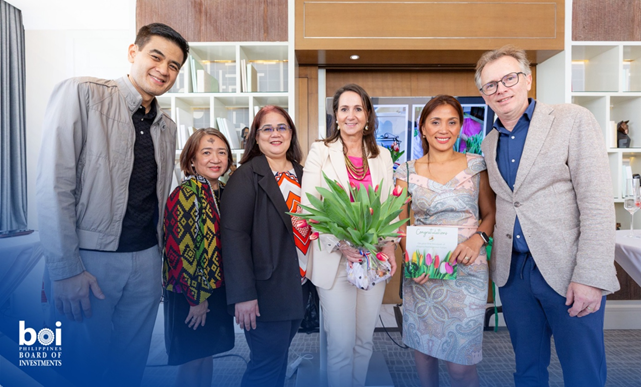Dutch-Filipino firm Phinl Corporation is investing P157.4 million to develop the first climate-controlled indoor hydroponic tulip farm in the Philippines and in the Asian region, the Board of Investments (BOI) announced.

A first in the country and in the Asian region, the flower farm is located in Maddela, Quirino. The flower farm was launched by Phinl and the BOI on Feb. 14 in Makati City.
The firm's innovative technology enables the country to produce tulips in a sub-tropical climate, since tulips are ideally grown in environments with cold temperatures.
Phinl is able to accomplish this through hydroponics where plants can be grown and cultivated in a water-based nutrient-rich solution, placed in a closed environment and set in controlled temperatures, humidity, and light intensity.
It employs tulip forcing, which is conducted using vertical farming technology from Phinl’s Dutch specialist partners to stimulate the tulip to flower.
The company imports tulip bulbs from the Netherlands or New Zealand as their primary raw materials, which are placed and preserved in a cold storage facility.
The present technology and capacity of the firm is able to produce 6,000 tulip stems per batch.
The Department of Trade and Industry (DTI) noted that tulip stems retail at P295 per piece.
The farm has generated 42 direct jobs for Filipinos with more potential employment opportunities as the company expands its production.
It also plans to integrate evolving technologies for plant growth and upskilling of its personnel.

Aside from the climate control advantages of the project, it also enables year-round production of tulips to meet domestic demand, with minimal impact from weather disturbances or changes experienced in traditional outdoor and greenhouse farming methods.
The company recently also exhibited their “Tulip TukTuk” or a Piaggio Ape Classic car customized into a Dutch tulip cart.
BOI Executive Director for Industry Development Services Corazon Dichosa remarked that the agency welcomes pioneers in the agriculture and floral sectors, noting the project as a “demonstration of our commitment to innovation and sustainability in agriculture.”
“The Phinl project is a clear example of our initiatives at the BOI, in collaboration with the Department of Agriculture, that champion sustainability in the agricultural industry. We have been registering projects that are scalable and leverage the latest technologies. In fact, in the last quarter, we have registered projects on integrated dairy farms, modern vegetable farms, and hybrid seed productions, among others,” said DTI Secretary and BOI Chairman Alfredo E. Pascual.
Some of these projects registered to the BOI in the last five years include Irradiation Solutions, Inc. (ISI)’s construction and operation of a commercial irradiation facility using Electron-Beam Technology Rizal; pesticide, herbicide, and fungicide drone sprayers for banana and pineapple plantations in Davao del Sur by Agriserna Tech Solutions, Inc.’s; natural foliar fertilizers in Batangas produced by Nature-Tech-Innovation Group Inc.’; Basic Necessity Corporation’s commercial production of bean sprouts and alfalfa sprouts in Cavite and Denso Philippines Corporation’s production of vegetables using hydroponic technology in Batangas; as well as SL Agritech Corporation’s propagation of hybrid rice parental seeds in Kalinga.